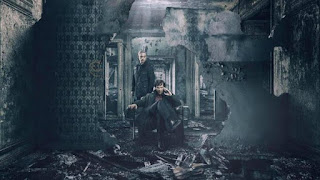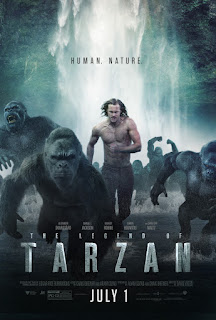A
while back, I blogged about the short story "
Story of Your Life," by Ted Chiang, which was the basis of the movie
Arrival (now Oscar nominated). I
found that story in a science fiction collection of Chiang's work
titled Stories of Your Life and Others, and I decided to go on and read
the whole thing -- eight tales in all.
Ted
Chiang is not an especially prolific writer. Although he's been writing
for over 25 years, this collection represents fully half of his entire
output. He's never pursued a full-length novel, staying with the shorter
form and publishing mostly in magazines. Stories of Your Life and
Others is the only collection to date of his work.
But
what Chiang lacks in quantity, he makes up in quality -- in particular,
the quality of his ideas. At the core of each of his stories is a
Twilight Zone-like "in a world" concept. Sometimes he's imagining an
entirely different Earth with fundamentally different technology or
history; other times he's positing a major scientific breakthrough in
our own world. In almost every case, he's unafraid to venture deep into
the weeds, allowing sophisticated theories of mathematics or physics to
play a major role in the story. His writing remains engaging, because
the idea itself is so captivating.
Here's a quick summary/take on the stories in this collection:
Tower
of Babylon. In ancient Babylonia, builders are creating a massive tower
literally miles tall -- so big it takes months to climb. The goal: to
reach heaven itself and reveal the true nature of the world. We follow
one worker in particular as he makes a shocking discovery. I'm not
entirely sure the payoff is as thrilling as the journey, but the story
overall is a great way of settling in with Chiang's style. Grade: B
Understand.
You've no doubt seen versions of the "person who gains
super-intelligence" trope. This is Chiang's take, built around a
character who discovers linkages in the world no one else can see, in
pursuit of a grand unifying meaning to existence. Unlike movies about
super-intelligence, the written form presents a great challenge in
letting you inside the thoughts of growing genius. Chiang handles it
capably. Grade: B+
Division
by Zero. A couple's relationship begins to unravel after one of them
uncovers a verifiable proof that mathematics aren't internally
consistent. I'm not sure the science and the emotion merge effectively
here (as, say, in Arrival / Story of Your Life), but the juxtaposition
of these two things itself is quite clever. So is the intriguing
narrative structure Chiang uses. Grade: B
Story
of Your Life. As I noted earlier, this is the basis for the movie
Arrival. You can read my spoiler thoughts
here. Grade: B+
Seventy-Two
Letters. This tale takes place in a world where golem animation exists,
facilitated by slipping papers with 72 written characters into a
would-be automaton. A global crisis also figures in the tale, driving
the main character into an effort to crack the DNA-like code to humanity
itself. This is perhaps the longest story in the collection, yet still
feels cut short to me. It reaches a conclusion of sorts, yet I feel
there was still more to mine from Chiang's fascinating premise. Grade:
A-
The
Evolution of Science. "Short story" scarcely fits -- this is "micro
fiction." In a scant few paragraphs, Chiang examines how technology can
divide society into have and have-nots, by examining a future tech that
would divide more than anything else imaginable. I wish there was more
of a narrative here, but the idea is once again tantalizing. Grade: B-
Hell
Is the Absence of God. This time, the "in a world" world is one where
God is known to be real, and His angels make regular visitations to
Earth that bestow miracles and wreak horrible collateral damage. The
protagonist of the story is a man whose wife was killed and sent to
Heaven, a man who can't find it in himself to "love God" for taking his
wife away. But if he can't find a way, he'll ultimately be sent to Hell
and be separated from her forever. It's the darkest tale of the
collection, but still compelling. Grade: B+
Liking
What You See: A Documentary. Written as though it were a transcript of a
documentary film, this story explores the controversy "in a world"
where technology exists that eliminates the ability to perceive a
person's appearance as "beautiful" or "ugly." For some, it represents
the leveling of the playing field, removing the ability to get by on
looks. For others, the costs of this tech are too great to overcome the
purported benefits. Ted Chiang was later said to be disappointed by this
story, having rushed it for inclusion in this book. But I do think he
does a good job of exploring all the way around his central premise in
surprising ways. Grade: A-.
Taken
altogether, I'd give Stories of Your Life and Others a B+. If you're a
science fiction fan who likes it extra science-y and "what if"fy, you
should give the collection a try.



















